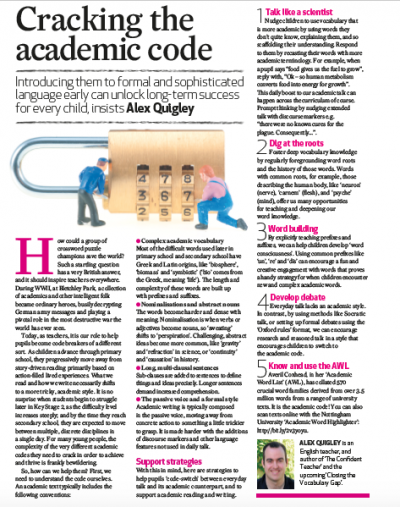(This text was first revealed in Educate Secondary Journal. You possibly can subscribe HERE)
How may a bunch of crossword puzzle champions save the world? Such a startling query has a really British reply, and it ought to encourage lecturers all over the place. Throughout WWII, at Bletchley Park, a group of teachers and different clever people turned abnormal heroes, busily decrypting German military messages and enjoying a pivotal function in probably the most damaging conflict the world has ever seen.
Immediately, as lecturers, it’s our function to assist pupils develop into code breakers of a distinct kind. As youngsters advance by way of major college, they progressively transfer away from story-driven studying based totally on action-filled lived experiences. What we learn and the way we write essentially shifts to a extra tough, educational fashion. It’s no shock when college students start to wrestle later in Key Stage 2, as the issue degree will increase steeply; and by the point they attain secondary college, they’re anticipated to maneuver between a number of, discrete disciplines in a single day. For a lot of younger individuals, the complexity of the very totally different educational codes they should crack as a way to obtain and thrive is frankly bewildering.
So, how can we assist them? First, we have to perceive the code ourselves. An instructional textual content sometimes contains the next conventions:
- Advanced educational vocabulary. Many of the troublesome phrases used later in major college and secondary college have Greek and Latin origins, like ‘biosphere’, ‘biomass’ and ‘symbiotic’ (‘bio’ comes from the Greek, that means ‘life’). The size and complexity of those phrases are constructed up with prefixes and suffixes.
- Nominalisations and summary nouns. The phrases develop into tougher and dense with that means. Nominalisation is when verbs or adjectives develop into nouns, so ‘sweating’ shifts to ‘perspiration’. Difficult, summary concepts develop into extra frequent, like ‘gravity’ and ‘refraction’ in science, or ‘continuity’ and ‘causation’ in historical past.
- Lengthy, multi-clausal sentences. Sub-clauses are added to sentences to outline issues and concepts exactly. Longer sentences demand elevated comprehension.
- The passive voice and a proper fashion. Tutorial writing is usually composed within the passive voice, transferring away from concrete motion to one thing slightly trickier to know. It’s made tougher with the additions of discourse markers and different language options not utilized in every day speak.
Help Methods
With this in thoughts, listed here are methods to assist pupils ‘code-switch’ between on a regular basis speak and its educational counterpart, and to assist educational studying and writing.
1. Speak like a scientist. Nudge youngsters to make use of vocabulary that’s extra educational by utilizing phrases they don’t fairly know, explaining them, and so scaffolding their understanding. Reply to them by recasting their phrases with extra educational terminology. For instance, when a pupil says “meals provides us the gasoline to develop”, reply with, “Okay – so human metabolism converts meals into vitality for progress”. This every day enhance to our educational speak can occur throughout the curriculum in fact. Immediate pondering by nudging prolonged speak with discourse markers e.g. “there have been no recognized cures for the plague. Consequently…”.
2. Dig on the roots. Foster deep vocabulary information by often foregrounding phrase roots and the historical past of these phrases. Phrases with frequent roots, for instance, these describing the human physique, like ‘neuron’ (nerve), ‘carnem’ (flesh), and ‘psyche’ (thoughts), supply us many alternatives for instructing and deepening our phrase information.
3 Phrase constructing. By explicitly instructing prefixes and suffixes, we can assist youngsters develop ‘phrase consciousness’. Utilizing frequent prefixes like ‘un’, ‘re’ and ‘dis’ can encourage a enjoyable and inventive engagement with phrases that proves a helpful technique for when youngsters encounter new and sophisticated educational phrases.
4 Develop debate. On a regular basis speak lacks an instructional fashion. In distinction, by utilizing strategies like Socratic speak, or organising formal debates utilizing the ‘Oxford guidelines’ format, we are able to encourage analysis and reasoned speak in a method that encourages youngsters to modify to the tutorial code.
5 Know and use the AWL. Averil Coxhead, in her ‘Tutorial Phrase Listing’ (AWL), has collated 570 essential phrase households derived from over 3.5 million phrases from a spread of college texts. It’s the educational code! It’s also possible to scan texts on-line with the Nottingham College ‘Tutorial Phrase Highlighter’.
You’ll find out many extra methods to crack the tutorial code in my newest e-book, ‘Closing the Vocabulary Hole‘ – accessible on Amazon HERE and on the Routledge web site HERE.

